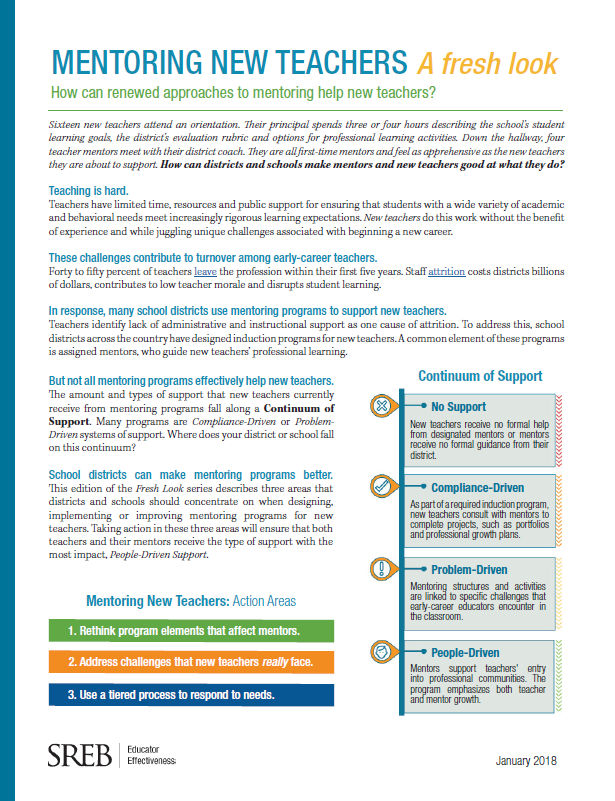The Tale of the Spoon
Closing the Achievement Gap One Utensil at a Time
From Mentoring New Teachers, part of the Fresh Look Series
The act of teaching is hard — that’s why most mentoring programs for new teachers focus on skill-related goals, such as improving instructional delivery and applying feedback. But the ins and outs of being a teacher are hard too. Becoming a teacher can come with emotional challenges. New teachers want assurance that the professional and personal challenges they are experiencing are normal. Supporting new teachers needs to be more than just sharing information, providing instructional coaching and designing professional development. It also needs to come in the forms of empathy, perspective and advice. When mentors work on professional growth goals without probing a teacher’s mindset or emotional health, skill development can become distracting, stressful and even counterproductive.
 My first year of teaching, I met my friend Emily. We were both fresh out of college and had just moved 800 miles from our respective homes to begin our teaching careers. Together, we went through typical first-year teacher experiences: We mourned the loss of our personal lives. We called our dads to express disbelief when we received our first paychecks, convinced there must have been some sort of accounting error. We commiserated about day-to-day stressors in our classrooms, schools and profession.
My first year of teaching, I met my friend Emily. We were both fresh out of college and had just moved 800 miles from our respective homes to begin our teaching careers. Together, we went through typical first-year teacher experiences: We mourned the loss of our personal lives. We called our dads to express disbelief when we received our first paychecks, convinced there must have been some sort of accounting error. We commiserated about day-to-day stressors in our classrooms, schools and profession.
Early in the school year, Emily was meeting with our mentor. Emily and I both worked at low-income schools, where closing the achievement gap was issue No. 1. We were both surrounded by a sense of urgency to learn “best practices” for everything from assessing students’ reading levels to casually preventing anarchy in the boys’ bathroom.
 Our mentor was giving Emily feedback about behavior management and sharing ideas for an upcoming vocabulary lesson when Emily interrupted with spontaneous sobbing. She hadn’t been focusing on any of the well-meaning feedback that our mentor was providing. In the rush of graduating, moving and starting new jobs, Emily and her roommate hadn’t really had time to make their apartment a home. They hadn’t even had a chance to buy essentials like beds or silverware.
Our mentor was giving Emily feedback about behavior management and sharing ideas for an upcoming vocabulary lesson when Emily interrupted with spontaneous sobbing. She hadn’t been focusing on any of the well-meaning feedback that our mentor was providing. In the rush of graduating, moving and starting new jobs, Emily and her roommate hadn’t really had time to make their apartment a home. They hadn’t even had a chance to buy essentials like beds or silverware.
Then Emily confessed something. For every single meal they had consumed since earning the title “teacher,” Emily and her roommate had been sharing a single, disposable plastic spoon. Cue stock 1950s horror movie screaming. They simply washed it between meals and passed it back and forth.
Our mentor immediately ended the session, drove Emily to her house and gave her some of her own silverware.
Now that Emily and I are older, wiser and (maybe) more well-adjusted, we look back on this and laugh. Despite how ridiculous it seems now, it illustrates how there truly is a Maslow’s Hierarchy of Needs for teachers. Sure, teachers don’t enter the profession seeking money and fame — but they aren’t martyrs either. New teachers need to hear that striving for a work-life balance (or simply a spoon) doesn’t make them unprofessional or uncommitted to their students’ success. Making sure that new teachers have spoons may not directly improve instruction, but personal and professional well-being are closely linked. If districts, schools and mentors aren’t intentional about recognizing this connection, their efforts to help new teachers deliver good instruction will be futile.
 In other words, if you don’t pay attention to it and give it some TLC, Maslow’s Hierarchy of Needs is capable of eating Bloom’s Taxonomy for lunch!
In other words, if you don’t pay attention to it and give it some TLC, Maslow’s Hierarchy of Needs is capable of eating Bloom’s Taxonomy for lunch!


